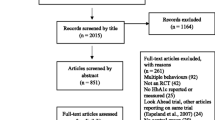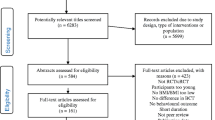Abstract
Purpose
Severe obesity is difficult to treat, and non-surgical treatment is not supported by robust evidence. The aim of the present study was to establish the immediate and longer-term outcomes following “personalized” form of group cognitive behavioural therapy for obesity (CBT-OB)—a new treatment designed to address specific cognitive processes that have been associated with attrition, weight loss, and weight maintenance in previous studies.
Methods
Sixty-seven adult patients with obesity (body mass index (BMI) ≥ 30 kg/m2) were recruited from consecutive referrals to an Italian National Health Service obesity clinic. Each patient was offered 22 group sessions of CBT-OB (14 in the 6-month weight-loss phase and 8 in the subsequent 12-month weight-maintenance phase).
Results
76.2% patients completed the treatment, with an average weight loss of 11.5% after 6 months (10% in the intention-to-treat analysis) and 9.9% (7.5% in the intention-to-treat analysis) after 18 months. Weight loss was associated with a significant reduction in cardiovascular risk factors, anxiety, depression, and eating disorder psychopathology, and an improvement in obesity-related quality of life.
Conclusions
These findings provide strong preliminary support for the use of CBT-OB for obesity in standard clinical settings, and justify its further evaluation in randomized controlled trials.
Level of evidence
Level III, longitudinal cohort study.


Similar content being viewed by others
References
Franz MJ, Boucher JL, Rutten-Ramos S, VanWormer JJ (2015) Lifestyle weight-loss intervention outcomes in overweight and obese adults with type 2 diabetes: a systematic review and meta-analysis of randomized clinical trials. J Acad Nutr Diet 115(9):1447–1463. https://doi.org/10.1016/j.jand.2015.02.031
Dalle Grave R, Melchionda N, Calugi S, Centis E, Tufano A, Fatati G, Fusco MA, Marchesini G (2005) Continuous care in the treatment of obesity: an observational multicentre study. J Int Med 258(3):265–273. https://doi.org/10.1111/j.1365-2796.2005.01524.x
Carels RA, Cacciapaglia HM, Douglass OM, Rydin S, O’Brien WH (2003) The early identification of poor treatment outcome in a women’s weight loss program. Eat Behav 4(3):265–282. https://doi.org/10.1016/s1471-0153(03)00029-1
Stuart RB (1996) Behavioral control of overeating. Obes Res 4(4):411–417
Dalle Grave R, Calugi S, El Ghoch M (2013) Lifestyle modification in the management of obesity: achievements and challenges. Eat Weight Disord 18(4):339–349. https://doi.org/10.1007/s40519-013-0049-4
Wadden TA, Butryn ML, Wilson C (2007) Lifestyle modification for the management of obesity. Gastroenterology 132(6):2226–2238. https://doi.org/10.1053/j.gastro.2007.03.051
Christian JG, Tsai AG, Bessesen DH (2010) Interpreting weight losses from lifestyle modification trials: using categorical data. Int J Obes (Lond) 34(1):207–209. https://doi.org/10.1038/ijo.2009.213
Wing RR Behavioral weight control. In: Wadden TA, Stunkard AJ (eds) Handbook of obesity treatment. Guildford Press, New York, pp 301–316
Keesey RE, Hirvonen MD (1997) Body weight set-points: Determination and adjustment. J Nutr 127(9):1875 s–1883 s
McGuire MT, Wing RR, Klem ML, Hill JO (1999) Behavioral strategies of individuals who have maintained long-term weight losses. Obes Res 7(4):334–341
Dalle Grave R, Calugi S, Marchesini G (2014) The influence of cognitive factors in the treatment of obesity: Lessons from the QUOVADIS study. Behav Res Ther 63(0):157–161. https://doi.org/10.1016/j.brat.2014.10.004
Cooper Z, Fairburn CG, Hawker DM (2003) Cognitive-behavioral treatment of obesity: a clinician’s guide. Guilford Press, New York
Melchionda N, Marchesini G, Apolone G, Cuzzolaro M, Mannucci E, Grossi E (2003) The QUOVADIS Study: features of obese Italian patients seeking treatment at specialist centers. Diabetes Nutr Metab 16(2):115–124
Jacob A, Moullec G, Lavoie KL, Laurin C, Cowan T, Tisshaw C, Kazazian C, Raddatz C, Bacon SL (2018) Impact of cognitive-behavioral interventions on weight loss and psychological outcomes: A meta-analysis. Health Psychol 37(5):417–432. https://doi.org/10.1037/hea0000576
Forman EM, Butryn ML, Manasse SM, Crosby RD, Goldstein SP, Wyckoff EP, Thomas JG (2016) Acceptance-based versus standard behavioral treatment for obesity: results from the mind your health randomized controlled trial. Obesity (Silver Spring) 24(10):2050–2056. https://doi.org/10.1002/oby.21601
Cooper Z, Doll HA, Hawker DM, Byrne S, Bonner G, Eeley E, O’Connor ME, Fairburn CG (2010) Testing a new cognitive behavioural treatment for obesity: a randomized controlled trial with three-year follow-up. Behav Res Ther 48(8):706–713. https://doi.org/10.1016/j.brat.2010.03.008
Dalle Grave R, Calugi S, El Ghoch M, Sartirana M (2018) Treating obesity with personalised cognitive behavioural therapy. Springer International Publishing AG, Cham. https://doi.org/10.1007/978-3-319-91497-8
Dalle Grave R, Calugi S, El Ghoch M (2015) Increasing adherence to diet and exercise through cognitive behavioural strategies. In: Lenzi A, Migliaccio S, Donini LM (eds) Multidisciplinary approach to obesity. Springer International Publishing, New York, pp 327–335. https://doi.org/10.1007/978-3-319-09045-0_27
Schwarzfuchs D, Golan R, Shai I (2012) Four-year follow-up after two-year dietary interventions. N Engl J Med 367(14):1373–1374. https://doi.org/10.1056/NEJMc1204792
Fairburn CG, Beglin SJ (1994) Assessment of eating disorders: interview or self-report questionnaire? Int J Eat Disord 16(4):363–370
Calugi S, Milanese C, Sartirana M, El Ghoch M, Sartori F, Geccherle E, Coppini A, Franchini C, Dalle Grave R (2017) The Eating Disorder Examination Questionnaire: reliability and validity of the Italian version. Eat Weight Disord 22(3):509–514. https://doi.org/10.1007/s40519-016-0276-6
Mond JM, Hay PJ, Rodgers B, Owen C, Beumont PJ (2004) Temporal stability of the Eating Disorder Examination Questionnaire. Int J Eat Disord 36(2):195–203. https://doi.org/10.1002/eat.20017
Peterson CB, Crosby RD, Wonderlich SA, Joiner T, Crow SJ, Mitchell JE, Bardone-Cone AM, Klein M, le Grange D (2007) Psychometric properties of the eating disorder examination-questionnaire: factor structure and internal consistency. Int J Eat Disord 40(4):386–389. https://doi.org/10.1002/eat.20373
Rose JS, Vaewsorn A, Rosselli-Navarra F, Wilson GT, Weissman RS (2013) Test-retest reliability of the eating disorder examination-questionnaire (EDE-Q) in a college sample. J Eat Disord 1:42. https://doi.org/10.1186/2050-2974-1-42
Reas DL, Grilo CM, Masheb RM (2006) Reliability of the eating disorder examination-Questionnaire in patients with binge eating disorder. Behav Res Ther 44(1):43–51. https://doi.org/10.1016/j.brat.2005.01.004
Beck AT, Robert A, Steer RA, Gregory K, Brown GK (1996) BDI-II: beck depression inventory manual, 2nd edn. Psychological Corporation, San Antonio
Wang YP, Gorenstein C (2013) Psychometric properties of the Beck Depression Inventory-II: a comprehensive review. Rev Bras Psiquiatr 35(4):416–431. https://doi.org/10.1590/1516-4446-2012-1048
Sica C, Ghisi M (2007) The Italian versions of the beck anxiety inventory and the beck depression inventory-II: psychometric properties and discriminant power. In: Lange MA (ed) Leading-edge psychological tests and testing research. NOVA Publishers, Hauppauge, pp 27–50
Beck AT, Epstein N, Brown G, Steer RA (1988) An inventory for measuring clinical anxiety: psychometric properties. J Consult Clin Psychol 56(6):893–897
Wilson KA, De Beurs E, Palmer CA, Chambless DL (1999) Beck anxiety inventory. In: Maruish ME (ed) The use of psychological testing for treatment planning and outcomes assessment, 2nd edn. Lawrence Erlbaum, Mahwah, pp 971–992
Mannucci E, Ricca V, Barciulli E, Di Bernardo M, Travaglini R, Cabras PL, Rotella CM (1999) Quality of life and overweight: the obesity related well-being (Orwell 97) questionnaire. Addict Behav 24(3):345–357
Calugi S, Marchesini G, El Ghoch M, Gavasso I, Dalle Grave R (2017) The influence of weight-loss expectations on weight loss and of weight-loss satisfaction on weight maintenance in severe obesity. J Acad Nutr Diet 117(1):32–38. https://doi.org/10.1016/j.jand.2016.09.001
Dalle Grave R, Calugi S, Gavasso I, El Ghoch M, Marchesini G (2013) A randomized trial of energy-restricted high-protein versus high-carbohydrate, low-fat diet in morbid obesity. Obesity (Silver Spring) 21(9):1774–1781. https://doi.org/10.1002/oby.20320
Singer JD, Willett JB (2003) Applied longitudinal data analysis. Oxford Press, New York
Shek DT, Ma CM (2011) Longitudinal data analyses using linear mixed models in SPSS: concepts, procedures and illustrations. Sci World J 11:42–76. https://doi.org/10.1100/tsw.2011.2
Dansinger ML, Gleason JA, Griffith JL, Selker HP, Schaefer EJ (2005) Comparison of the Atkins, Ornish, Weight Watchers, and Zone diets for weight loss and heart disease risk reduction: a randomized trial. Jama 293(1):43–53. https://doi.org/10.1001/jama.293.1.43
Fitzpatrick SL, Jeffery R, Johnson KC, Roche CC, Van Dorsten B, Gee M, Johnson RA, Charleston J, Dotson K, Walkup MP, Hill-Briggs F, Brancati FL (2014) Baseline predictors of missed visits in the Look AHEAD study. Obesity (Silver Spring) 22(1):131–140. https://doi.org/10.1002/oby.20613
Dalle Grave R, Calugi S, Molinari E, Petroni ML, Bondi M, Compare A, Marchesini G (2005) Weight loss expectations in obese patients and treatment attrition: an observational multicenter study. Obes Res 13(11):1961–1969. https://doi.org/10.1038/oby.2005.241
Grossi E, Dalle Grave R, Mannucci E, Molinari E, Compare A, Cuzzolaro M, Marchesini G (2006) Complexity of attrition in the treatment of obesity: clues from a structured telephone interview. Int J Obes 30(7):1132–1137. https://doi.org/10.1038/sj.ijo.0803244
Melchionda N, Besteghi L, Di Domizio S, Pasqui F, Nuccitelli C, Migliorini S, Baraldi L, Natale S, Manini R, Bellini M, Belsito C, Forlani G, Marchesini G (2003) Cognitive behavioural therapy for obesity: one-year follow-up in a clinical setting. Eat Weight Disord 8(3):188–193
Sasdelli AS, Petroni ML, Delli Paoli A, Collini G, Calugi S, Dalle Grave R, Marchesini G (2018) Expected benefits and motivation to weight loss in relation to treatment outcomes in group-based cognitive-behavior therapy of obesity. Eat Weight Disord 23(2):205–214. https://doi.org/10.1007/s40519-017-0475-9
Knowler WC, Barrett-Connor E, Fowler SE, Hamman RF, Lachin JM, Walker EA, Nathan DM (2002) Reduction in the incidence of type 2 diabetes with lifestyle intervention or metformin. N Engl J Med 346(6):393–403. https://doi.org/10.1056/NEJMoa012512
Jensen MD, Ryan DH, Apovian CM, Ard JD, Comuzzie AG, Donato KA, Hu FB, Hubbard VS, Jakicic JM, Kushner RF, Loria CM, Millen BE, Nonas CA, Pi-Sunyer FX, Stevens J, Stevens VJ, Wadden TA, Wolfe BM, Yanovski SZ (2014) 2013 AHA/ACC/TOS guideline for the management of overweight and obesity in adults: a report of the American College of Cardiology/American Heart Association Task Force on Practice Guidelines and The Obesity Society. J Am Coll Cardiol 63(25 Pt B):2985–3023. https://doi.org/10.1016/j.jacc.2013.11.004
Perri MG, Sears SF Jr, Clark JE (1993) Strategies for improving maintenance of weight loss. Toward a continuous care model of obesity management. Diabetes Care 16(1):200–209
Author information
Authors and Affiliations
Corresponding author
Ethics declarations
Conflict of interest
Hereby authors state that they have no conflict of interest to declare.
Ethical approval
All procedures performed in studies involving human participants were in accordance with the ethical standards of the institutional and/or national research committee and with the 1964 Helsinki declaration and its later amendments or comparable ethical standards.
Informed consent
Informed consent was obtained from all those who participated in the study.
Rights and permissions
About this article
Cite this article
Dalle Grave, R., Calugi, S., Bosco, G. et al. Personalized group cognitive behavioural therapy for obesity: a longitudinal study in a real-world clinical setting. Eat Weight Disord 25, 337–346 (2020). https://doi.org/10.1007/s40519-018-0593-z
Received:
Accepted:
Published:
Issue Date:
DOI: https://doi.org/10.1007/s40519-018-0593-z




